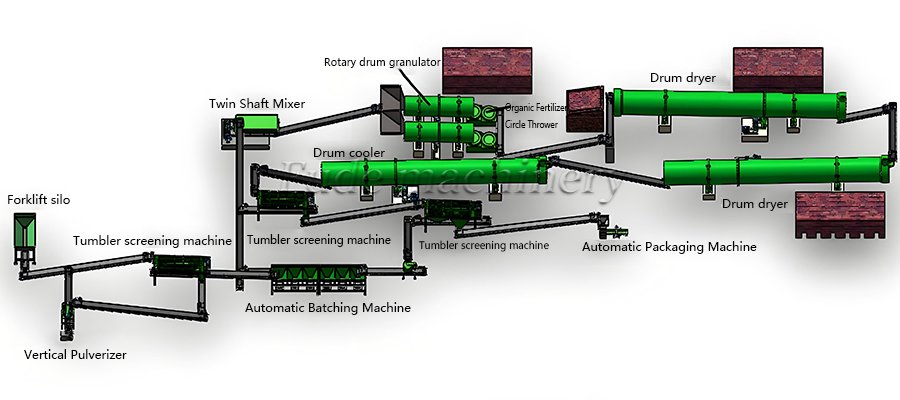Can urea pelletization technology improve agricultural productivity?
244Urea is a widely used nitrogen fertilizer in modern agriculture. Due to its high nitrogen content, it is an important plant growth promoter.
View detailsSearch the whole station
Have you ever thought about how waste products such as chicken manure and charcoal can be turned into a valuable resource? Today, let’s explore the production of a special biochar-based fertilizer using these two materials! If you want more detailed information, click here for more.
Chicken manure is a type of organic waste produced by poultry farming. It is composed of essential nutrients such as nitrogen, phosphorus, and potassium, which are good for soil fertility. On the other hand, charcoal, a lightweight black carbon residue, is produced by removing water and other volatile matters from animal and vegetation substances. It is rich in carbon content with high stability and long-term effectiveness in soil.
The combining of chicken manure and charcoal results in a biochar-based fertilizer which boasts multiple benefits. It not only enriches soil with nutrients but also improves soil structure, enhances water and nutrient retention, and reduces greenhouse gas emissions. The high carbon content in charcoal helps in boosting soil fertility, while nutrient-rich chicken manure provides essential nutrients for plant growth.

The production process of this biochar-based and chicken manure as fertilizer involves several steps:
Biochar fertilizer has outstanding advantages. On soil improvement, its porous structure can improve soil aeration and water permeability, regulate acidity and alkalinity, and increase organic matter, while ordinary fertilizers have limited structural improvement and may lead to nodules; on nutrient supply, biochar fertilizers can adsorb nutrients to release slowly and improve utilization, while ordinary fertilizers release quickly and have low utilization; on environmental protection, biochar fertilizers can sequester carbon and reduce emission and reduce surface pollution, while ordinary fertilizers have high energy consumption and are easy to pollute; on crop growth In terms of crop growth, biochar fertilizer promotes root growth and enhances stress resistance, while ordinary fertilizer promotes weakly and may injure roots; in terms of economic benefits, biochar fertilizer reduces the quantity and cost and improves the quality, while ordinary fertilizer has high cost and may lower the quality.

The working principle of making biochar fertilizer is that biomass raw materials (e.g. wood, straw, etc.) are firstly made into biochar by pyrolysis at high temperature in anoxic or oxygen-limited conditions, during which the biomass undergoes thermal decomposition, removes volatiles, and forms biochar with a porous structure and high carbon content, whose porous structure can adsorb nutrients and improve the soil structure; and then mixing the biochar with the raw materials of fertilizers (organic fertilizers, chemical fertilizers, etc.), which can provide nutrients for the growth of crops by adsorption. After mixing the biochar with fertilizer raw materials (organic fertilizer, chemical fertilizer, etc.), the biochar fixes the fertilizer nutrients by its adsorption characteristics, reduces nutrient loss and volatilization, and also regulates the soil environment through its own characteristics, such as improving aeration and permeability, regulating acidity and alkalinity, etc., so as to provide a continuous and stable supply of nutrients for the growth of crops, and at the same time, enhance the fertility of the soil and the resilience of crops, and ultimately, make the biochar fertilizers with the functions of both soil improvement and nutrient supply.
In conclusion, the production of biochar-based fertilizer using chicken manure and charcoal is an innovative and sustainable approach, which not only manages waste effectively but also contributes to soil health and climate change mitigation. Finally, if you would like to learn more,You can consult us Fude Machinery!
Urea is a widely used nitrogen fertilizer in modern agriculture. Due to its high nitrogen content, it is an important plant growth promoter.
View detailsMineral fertilizers demand specific raw materials to ensure optimal nutrient content and efficacy.
View detailsindustries engaged in mineral fertilizer granule manufacturing benefit significantly from the adoption of advanced pan granulating equipment.
View detailsOrganic fertilizer granulator is a machine that converts organic waste materials such as animal manure into granules.
View details